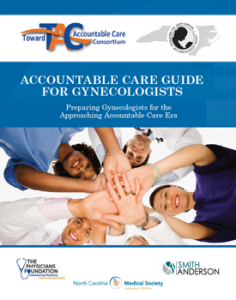In retrospect, 2015 has been a year of notable accomplishments for the North Carolina Medical Society (NCMS) and it marked the next leap forward in the enormous project of Medicaid reform. The following look back at the past year gives you a brief glimpse of the breadth of the NCMS’ work on your behalf. We look forward to working with you and for you in the coming year.
Medicaid reform remains a top priority for the NCMS, and this year saw reform legislation enacted. The new law, passed during one of the longest legislative sessions on record, invites managed care organizations and provider-led entities to administer the state’s Medicaid program. This shifting of risk from the state to other entities is a long and complex process that will unfold over the next several years with enrollment estimated to begin in the first quarter of 2018. The NCMS is working diligently to protect the interests of patients and their physicians and to ensure the reforms result in a sensible system that leads to healthier communities, better care for patients and smarter spending.
- What the State’s Compromise Medicaid Reform Bill May Mean to Your Practice
- NCMS Working to Ensure Sensible Medicaid Reform

A new governance structure was adopted by the NCMS in 2015, moving policy making authority from the House of Delegates to the NCMS Board of Directors. Now, any member may bring a concern directly to the Board for consideration. Also, Board meetings in 2016 will be held throughout the state to encourage more participation among members.
- Delegates Vote to Change NCMS Governance Structure. What Does This Change Mean to You?
- NCMS Begins Implementation of New Governance System
For the first time in 20 years, North Carolina’s physician fee schedule for workers’ comp was updated and implemented. The NCMS was instrumental in bringing together various specialties and community stakeholders to reach a compromise fee schedule, which promises better access to care for injured workers.
- Huge Win on Workers’ Comp Medical Fee Schedule Workers’ Comp
- New Workers’ Comp Physician Fee Schedule Takes Effect Today
- Workers’ Comp Study Reveals Positive Trend for Physician Fees
The NCMS and its members through their grassroots efforts helped push to repeal the long-hated sustainable growth rate (SGR) formula for Medicare. After nearly a decade of trying, the SGR was repealed in 2015. The new legislation, the Medicare Access and CHIP Reauthorization Act (MACRA), gives us a new acronym and many new provisions to understand. The NCMS Director of Health Policy Jennifer Gasperini has been analyzing what MACRA may mean to you. Follow her on the ‘Quality Time with the NCMS’ blog for the latest information.
- The SGR Has Been Repealed. Now What?
- What MACRA Means to You. A Detailed Summary of the Historic SGR Repeal Bill
Also at the federal level, NCMS helped convince several North Carolina congressional representatives to introduce and support legislation to reform the RAC Audit process.
Much sound and fury occurred leading up to the transition to the ICD-10 codes on October 1, 2015, but a major claims processing meltdown never materialized.
 The NCMS continued to support the move to value-based health care models through spearheading resource guides and the hugely popular NC ACO Collaborative and MSSP Council, which brings together those in North Carolina interested in this model of care and those who are actively pursuing it. More guides are coming in 2016, and the meetings for the Collaborative and Council have been set for the coming year.
The NCMS continued to support the move to value-based health care models through spearheading resource guides and the hugely popular NC ACO Collaborative and MSSP Council, which brings together those in North Carolina interested in this model of care and those who are actively pursuing it. More guides are coming in 2016, and the meetings for the Collaborative and Council have been set for the coming year.
- New Resources From the Toward Accountable Care Consortium
- More Resources Available for Specialists Interested in ACOs
- NC Medicare Shared Savings Program Council Members Share Best Practices
While the move to a value-based model of care is being encouraged at the federal level, those practices in rural areas have unique challenges. The NCMS Foundation began the Rural ACO Initiative in 2015 to help rural providers successfully form or participate in accountable care organizations. The Kate B. Reynolds Charitable Trust granted nearly $500,000 to help accomplish this goal.
- NCMSF Receives Grant to Improve Access to Health Care for Those In Rural NC
- NCMS Foundation’s Rural ACO Initiative Pioneering New Territory
The NCMS Practice Consulting Services also helped practices navigate the often complicated process of attaining Patient Centered Medical Home or Patient Centered Specialty Practice recognition among other quality designations. Many practices benefitted from our Consulting Services in 2015, with medical groups across the state achieving the highest quality and meaningful use recognition. Designations from the National Committee for Quality Assurance (NCQA) serve as a quality ‘seal of approval’ and can lead to incentive payments for the practice.
- NCMS Helps Dozens of Practices Improve Care and Increase Revenue
- NCMS Practice Consulting Services Offers Help Statewide
![]() The Kanof Institute for Physician Leadership expanded to include three tracks – the Leadership College, Clinical Quality or CQ’U’ and a new pilot program on Health Care Leadership and Management began in 2015. These leadership development programs continue to grow in popularity as hundreds of program alumni are found in many key health care leadership positions throughout the state and beyond.
The Kanof Institute for Physician Leadership expanded to include three tracks – the Leadership College, Clinical Quality or CQ’U’ and a new pilot program on Health Care Leadership and Management began in 2015. These leadership development programs continue to grow in popularity as hundreds of program alumni are found in many key health care leadership positions throughout the state and beyond.
Opioid abuse is a national epidemic, and a problem here in North Carolina. The NCMS has been vocal about how physicians can help alleviate this problem. Read an editorial by our 2015 President Robert Schaaf, MD, published in the Raleigh News & Observer. At the General Assembly, the NCMS has pushed for the Controlled Substance Reporting System (CSRS) for physicians and pharmacists to better track patients who may be abusing opioids. Improvements to the CSRS were enacted this year make it easier to use.
Four years after the NCMS was successful in passing tort reform legislation, the positive impact of this historic legislation is just now becoming clear through data collected over the intervening years.
Thanks to help from the NCMS, physician assistants now have a dedicated seat on the NC Medical Board.
 To remind doctors their patients appreciate them, the NCMS helped update and localize the annual celebration of Doctors’ Day with an online “NC Doctor of the Year” contest. Dr. Gloria Graham, a Morehead City dermatologist was named 2015 NC Doctor of the Year.
To remind doctors their patients appreciate them, the NCMS helped update and localize the annual celebration of Doctors’ Day with an online “NC Doctor of the Year” contest. Dr. Gloria Graham, a Morehead City dermatologist was named 2015 NC Doctor of the Year.
